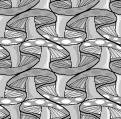This post will explain all I know of "Amber." And I'm sure I don't know everything, so anyone who knows more, please post a comment.
AMBER is the name of a project that started years ago. It is the American Chesterton Society's attempt to get everything Chesterton wrote in electronic searchable format. There is a person in our group, a member of our society, so devoted to this work that he took two years of his life and spent them scanning and coding the works of Chesterton. They are now in an electronic format, but as of yet, unavailable to the public. I suppose all it would take is some monetary contributions, which can be made at the
American Chesterton Society with the specification "AMBER Project" so your contribution can be directed to that work, if this is something you are interested in helping with.
Now many of the works of Chesterton's are on line. His work, for the most part, is in the public domain, and there are sources, such as
Project Gutenberg, where many public domain works, including Chesterton's, can be found.
The beauty of AMBER is this: it is entirely searchable, and referencable (probably not a real word). What I mean is, that at Project Gutenberg, you may be able to search a single book, such as
Orthodoxy, on a word that you are looking for quotes on, such as "Education" or "Catholic" or "Liberty", for example. Or, if you half remember a quote, you can search on the phrase you recall, such as "meaning of man" or whatever, and see if it is in that particular work.
With AMBER, you can search ALL the works of Chesterton for those same terms or phrases, and, once the quote is found, AMBER will give you the book and page number where it can be found.
In terms of references, and as a writer I can tell you this, this AMBER is invaluable for research and references. You would not have to go to the library, find a particular edition of a Chesterton book, and search through it to find out what page the particular quote is actually on. AMBER would help you with that.
I have used the AMBER service, by e-mailing the ACS (or using the "Quotemeister" service at hte ACS web page) and it is truly and really helpful.
I would love to see this project made public. This would involve (and those who know, help me out here) either a) making the information available in some sort of format such as CD-rom or DVD (however, I believe the sheer volume of information makes this impractical, as it would take MANY Cd's or many DVD's) or b) putting it all on-line, which I would believe would take money to 1. purchase a domain name 2. have a server that could store that much information and 3. pay someone to maintain the whole thing.
And the name AMBER, as Anon posted in the comments of the previous post, comes from the Greek name for electricity. I used to think it was some sort of mysterious acronym such as "Associated Manuscripts By Educated Rebels" or something meaningful like that. But it doesn't.
Any more questions about AMBER?







